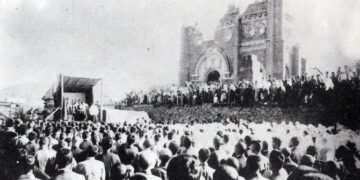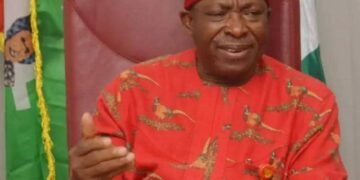The recent appeals for the release of Nnamdi Kanu, the leader of the proscribed Indigenous People of Biafra (IPOB), highlight the growing concerns over his prolonged detention and its implications for the South-East region of Nigeria. The calls, coming from prominent figures such as the Catholic Bishops Conference of Nigeria (CBCN) and Monday Ubani, former second national vice-president of the Nigerian Bar Association (NBA), underscore the urgency of addressing this issue through a political perspective.
Kanu’s detention, amidst charges of treasonable felony and terrorism, has not only stirred legal debates but also sparked socio-political tensions in the country, particularly, the Eastern region. The denial of bail, coupled with allegations of constitutional violations regarding his treatment in custody, has fueled discontent and raised questions about due process and human rights.
The Catholic Bishops Conference of Nigeria’s appeal to President Bola Tinubu to intervene stresses the belief that Kanu’s release could pave the way for economic prosperity and security in the South-East. The acknowledgment of Kanu’s influence on the region’s stability suggests that his continued incarceration might exacerbate existing challenges, including insecurity and economic setbacks.
Similarly, Monday Ubani’s plea for a political solution resonates with those advocating for a peaceful resolution to the Kanu saga. His assertion that Kanu’s release could potentially quell unrest by dissuading individuals from exploiting his detention to incite violence reflects a pragmatic approach to addressing the root causes of insecurity in the South-East.
While the debate over whether Kanu’s release would automatically end all security crises in the region remains uncertain, it is evident that his detention has become a focal point for various grievances and tensions. As such, the need for a political dialogue to address these underlying issues cannot be overstated.
President Tinubu, as a key political figure with influence and connections, is urged to consider the broader implications of Kanu’s continued detention and explore avenues for a political resolution. A proactive approach that prioritizes dialogue, reconciliation, and inclusivity is essential to fostering peace and stability in the South-East.
Ultimately, the release of Nnamdi Kanu should not be viewed solely as a legal matter but as an opportunity to address deeper socio-political challenges and promote national unity. It is time for all stakeholders to engage constructively in finding a lasting solution that respects the rule of law, upholds human rights, and advances the interests of all Nigerians, regardless of ethnicity or creed.











































